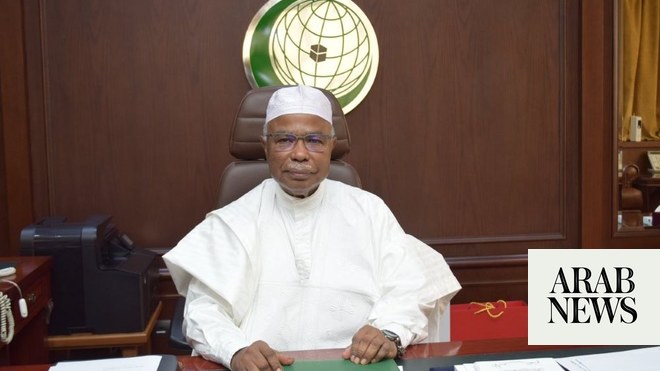
US forces have come under mortar and rocket attack in Iraq on multiple occasions in the past 12 months. However, the assault this week on a base in Irbil stood out from the others for a couple of reasons.
It was the first such attack on American forces in Iraq since President Joe Biden took office on Jan. 20, and the deadliest in more than a year. One civilian contractor died and several people were wounded, including a US service member.
Unsurprisingly, the militia group that claimed responsibility for the attack is thought to have close links to Iran. This would fit a pattern of behavior in which Tehran uses such assaults to test a new US administration. Senior American officials said that Washington “reserves the right to respond in the time and manner of our choosing.”
Former President Donald Trump drew a “red line” when it came to the killing of US forces in Iraq; it remains to be seen whether Biden will maintain this approach and act accordingly.
While in office, Trump called on NATO to take more responsibility and action in places such as the Middle East. This was part of a larger burden-sharing debate within the alliance.
Iraq is a good example of a place where NATO has been involved in the Middle East, and where it is expected to do even more. As a result, the attack in Erbil on Monday comes at an interesting time for the organization.
Coincidentally, the alliance held a meeting of defense ministers from its 30 member nations this week. It is the first such gathering since the Biden administration moved into the White House, and NATO’s involvement in Iraq was high on the agenda.
In October 2018, the alliance established NATO Mission Iraq (NMI), a noncombat training mission. It currently consists of several hundred trainers from a number of member nations and non-NATO partner countries such as Australia, Finland and Sweden.
The mission was launched at a time when the main focus was on defeating Daesh. The primary aim was to rebuild and retrain the Iraqi security forces so that a repeat of the capture of Mosul by the militants in 2014, and the subsequent rout of the Iraqi military, could be avoided.
Many people might be surprised to learn that NATO has been involved in Iraq in one way or another since just after the US invasion in 2003. Unlike NATO missions in places such as Afghanistan or the Balkans, however, the alliance’s role in Iraq gets very little international attention.
Between 2004 and 2011, NATO carried out a smaller training operation designed to improve the capabilities of the Iraqi military. After 2011, NATO’s involvement in the country was reduced until 2015 when, after the fall of Mosul, the Iraqi government requested the organization’s support for another training mission in Jordan. However it was not until 2018 that NMI was activated.
Considering NATO’s past commitments in Iraq, the repeated US calls for the alliance to do more in the region, and this week’s attack against US forces in Irbil, it is therefore no surprise that Iraq is back on the organization’s agenda.
Ahead of this week’s NATO meeting, it appeared likely that leaders would agree to increase and expand NMI. Some media reports even suggested that the number of NATO troops sent to Iraq to train the security forces could increase from the current level of a few hundred to 4,000. This would make the mission in Iraq the largest military operation currently undertaken by the alliance.
There are many potential benefits arising from NATO having a role in Iraq. Firstly, as noted the organization has been involved in Iraq for a number of years and so it has a stake in ensuring the nation has a stable and secure future.
Secondly, the alliance has accumulated a lot of experience in training security forces from its operations in Afghanistan. The lessons it has learned can be applied to Iraq.
Thirdly, NATO’s presence in Iraq helps make the rest of the Middle East and Europe safer. While not entirely part of the organization’s area of responsibility, as defined by the 1949 North Atlantic Treaty, the alliance cannot afford to ignore the Middle East. History, and recent events, show that what happens in the region can quickly spill over into Europe.
Many people might be surprised to learn that NATO has been involved in Iraq in one way or another since just after the US invasion in 2003.
Luke Coffey
Finally, while it might be hard for some US policymakers to swallow, in some sections of Iraqi society, and among some with the country’s political establishment, it is more acceptable to have NATO forces operating in the country than US troops.
None of this is to say that NATO is going to change its core mission of territorial defense and deterring Russian aggression. For the foreseeable future, Russia will remain its top focus — and rightfully so.
But in the 21st century an alliance such as NATO must be able to handle more than one thing at a time. This is why the organization’s noncombat involvement in Iraq, by leading a training mission, is not only reasonable but also necessary for the security of the transatlantic community.
Luke Coffey is director of the Douglas and Sarah Allison Center for Foreign Policy at the Heritage Foundation. Twitter: @LukeDCoffey
Disclaimer: Views expressed by writers in this section are their own and do not necessarily reflect Arab News" point-of-view











